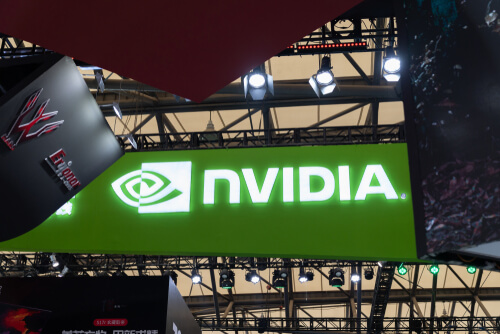Nvidia Corp.’s shares dipped on Wednesday, paring recent gains, as a dim outlook for Chinese revenue overshadowed robust quarterly earnings from the leading chipmaker.
Nvidia closed the trading session 0.92% lower at $499.44 and declined by 1.74% to $480.75 in after-market trade.
The world’s largest chipmaker posted adjusted earnings per share (EPS) of $4.02 on $18.12 billion in revenue in the third quarter, beating analysts’ forecasts of $3.36 EPS on $16.18 billion in revenue.
The company also projected approximately $20 billion in revenue for the December quarter, surpassing expectations of $17.91 billion.
However, Nvidia cited US restrictions on exporting artificial intelligence (AI) chips to China as the reason for a possibly considerable drop in future revenue from the country.
China, representing about a quarter of the company’s revenue, has been hit with US export restrictions this year, severing its connections with the rapidly growing AI industry.
Nvidia anticipates higher revenue from other regions to curb challenges from the country. However, its warning still raised concerns about the prospect of future revenue losing momentum amid growing AI interest.
Following a drop in the chipmaker’s shares from record highs in after-hours trading, the losses rippled through most of the company’s Asian suppliers.
Japan’s Advantest Corp., providing semiconductor testing equipment to Nvidia, dropped 3.04% to ¥4,632.00, while Tokyo Electron Ltd., a chipmaking equipment manufacturer, fell 0.93% to ¥23,945.00.
Furthermore, Taiwan Semiconductor (TSMC) Co. Ltd., the world’s largest contract chipmaker and major Nvidia supplier, dipped by 1.55% to $98.41 in the US. South Korea’s SK Hynix Inc. decreased by 0.53% to ₩131,300.00, while Samsung Electronics Co. Ltd. was steady at ₩72,800.00.
SoftBank Group Corp., linked to Nvidia through Arm Holdings plc, stumbled by 0.27% to ¥6,198.00, while Arm dipped 0.03% to $58.66.
Nvidia Thrives Amid Chip Downturn Due to AI Hype
Nvidia successfully navigated the chipmaking industry’s broader decline, weathering the impact of increased interest rates and weaker demand for consumer electronics.
The company attributed its earnings growth to AI, considering it is one of the several semiconductor firms that develop products tailored to AI development. Nvidia recently introduced the H200, its latest flagship AI chip.
Nvidia’s significant valuations this year have been propelled by AI enthusiasm, which has also elevated the shares of its key Asian suppliers.
However, other major chipmakers, notably TSMC, have not embraced the AI hype Nvidia has. TSMC cautioned that while AI may boost demand, the chipmaking industry faces challenges. The Taiwanese chipmaker has posted sharp drops in its earnings this year.











